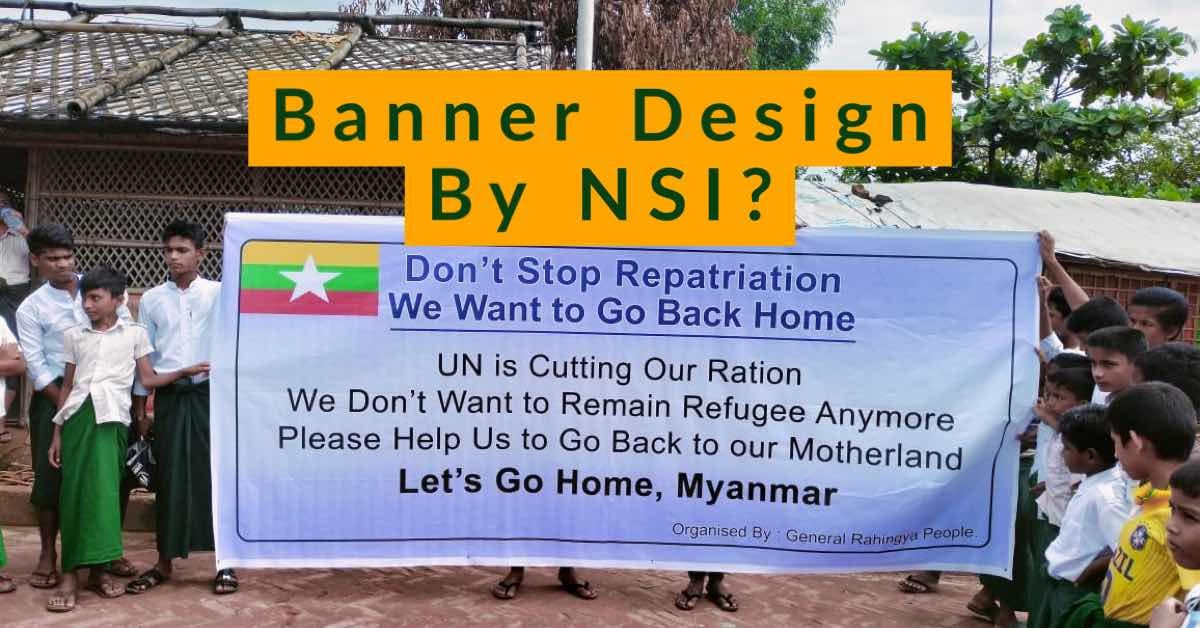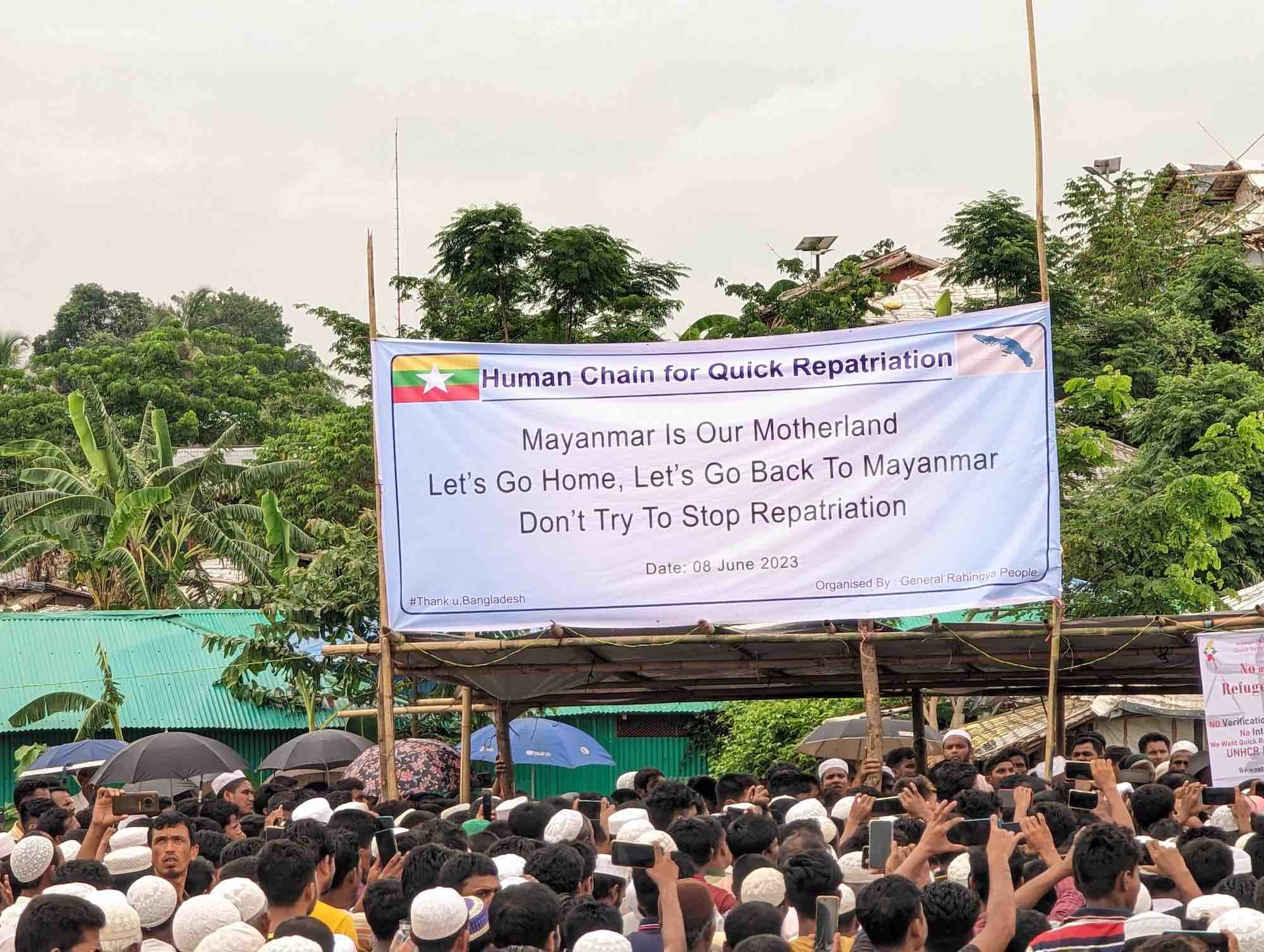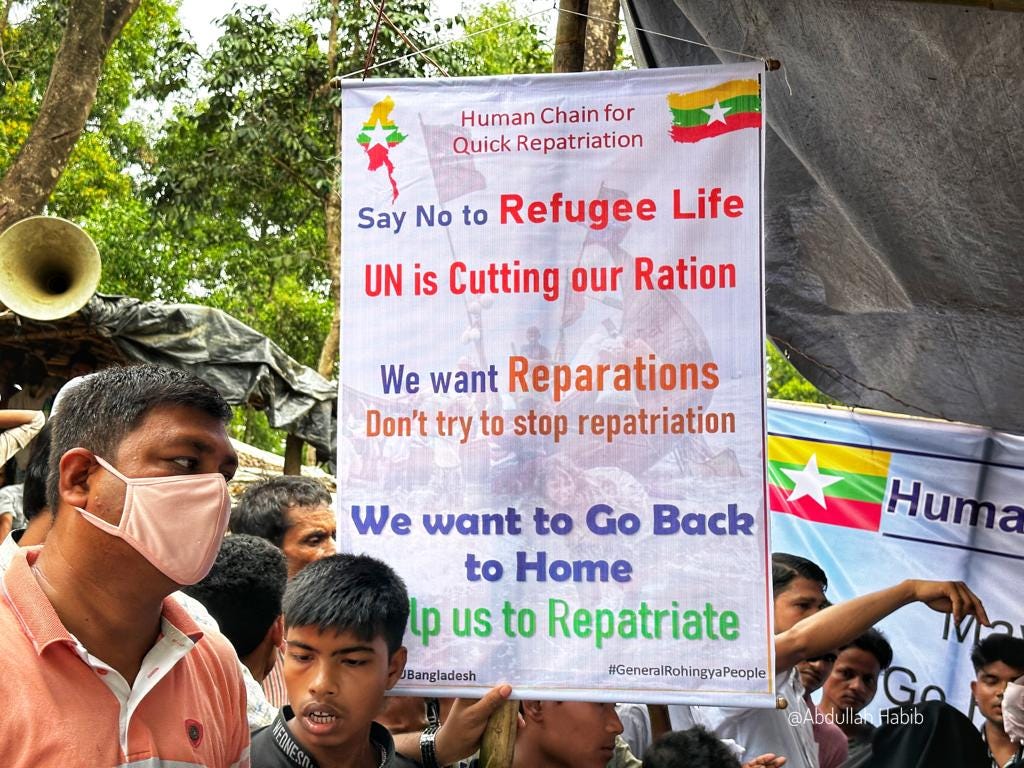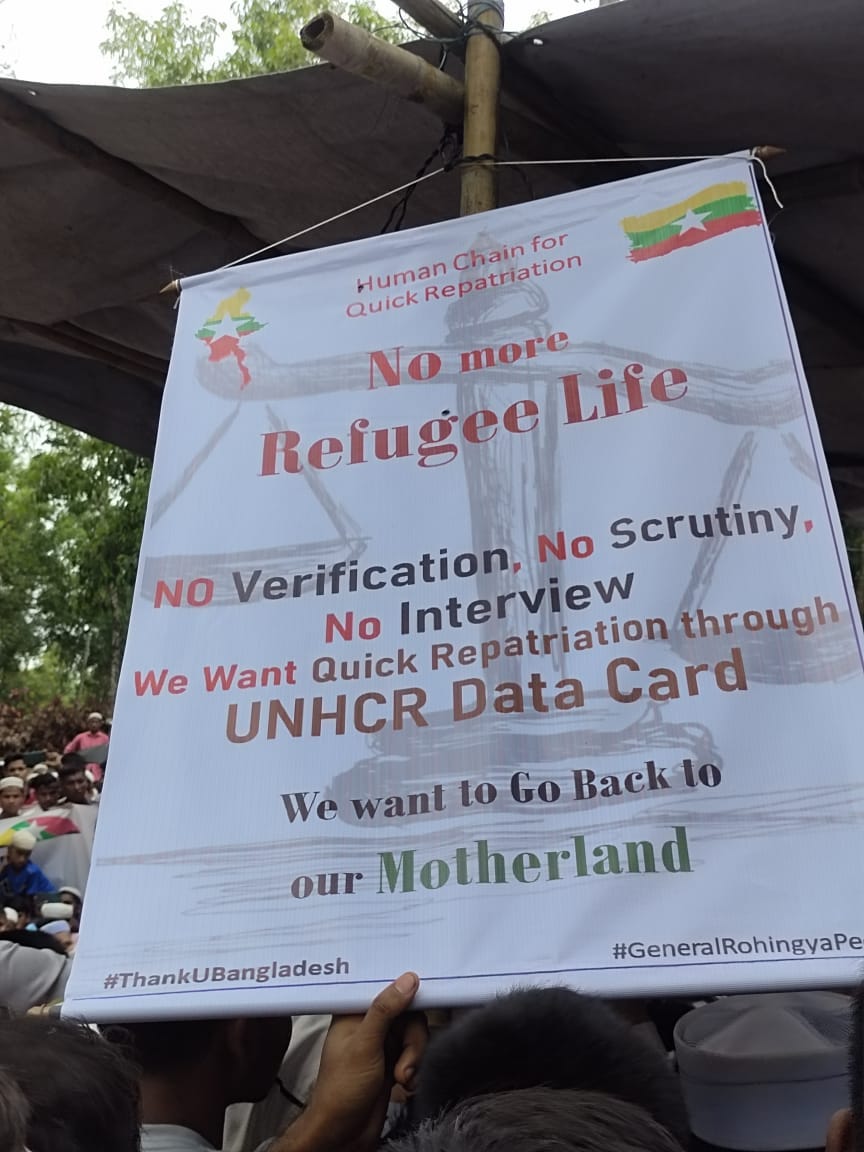Crafted Banners, Unravelled Plans: Bangladesh's NSI Meets its Match
The 'Let's Go Home' Campaign. A collection of banner examples illustrating the kind of messaging that the NSI disseminated

In this issue of Rohingya Refugee News, I aim to amplify the concerns raised in my OpEd published in the Democratic Voice of Burma (DVB). The article lifts the veil on the tactics currently being employed by Bangladeshi authorities in their handling of the Rohingya refugee crisis. Complementing the OpEd, this issue presents a collection of banner examples, a visual testament to the kind of manipulative messaging disseminated by Bangladesh's intelligence agency, the National Security Intelligence (NSI). Together, the OpEd and these examples offer an insight into their questionable tactics.
In the context of a fraught history marked by unsustainable repatriation attempts and recurrent failures, it is especially disconcerting to see the NSI resorting to orchestrated sham demonstrations. These demonstrations are deceptively portrayed as if they are grassroots movements emerging organically from the Rohingya themselves - a narrative that could not be further from the truth.
This unsettling strategy, primarily evidenced by the 'Let's Go Home' campaign, is a masterclass in single focus messaging. But beneath the surface, there's a concerning aim: a push for unsafe and unchecked repatriation, while conveniently sidelining the Rohingyas' calls for rights, citizenship, and justice.

The banners hoisted in these demonstrations tell a story. With messaging heavily skewed towards an urgent desire for repatriation, they seem suspiciously uniform. The clues point back to their creator - not the 'general Rohingya people' (see bottom right) as they would have you believe, but the NSI itself.
Take the above banner, which exudes the narrative discussed in the OpEd. It strongly emphasises the theme of repatriation, urging for a swift return to Myanmar and underscoring Myanmar as the Rohingya's motherland. This aligns seamlessly with the NSI's focal point on promoting repatriation while sidestepping crucial matters such as rights, citizenship, and justice.
It is worth noting that the RRRC (Rohingya Refugee Relief and Repatriation Commissioner) consistently communicates to the Rohingya refugees that they must go back in order to assert their demands - the emphasis on repatriation is often conveyed as a prerequisite for advocating for their rights.
The inclusion of "Human Chain for Quick Repatriation" suggests a collective effort to expedite the return process. The inclusion of "#ThankYouBangladesh" acknowledges the host country's role in providing refuge to the Rohingya community. This aspect could potentially be seen as an attempt to maintain a positive relationship with Bangladesh authorities, aligning with the OpEd's discussion of the delicate dynamics involved in the repatriation efforts.
Overall, this banner encapsulates the NSI's tactics as outlined in the article: crafting a single-focus message favouring repatriation, while seemingly ignoring the complex issues surrounding safety, citizenship, and justice for the Rohingya people.
The above banner also brings attention to the challenges endured in the refugee camps, with slogans like "UN is Cutting our Rations" and "Say No to Refugee Life." These align with the NSI strategy of highlighting the camp difficulties to advance the repatriation narrative.
Interestingly, the banner includes a demand for reparations ("We want Reparations"), which may be an attempt to appeal to external observers. However, the call for reparations seems incongruous with the NSI narrative that primarily emphasises repatriation, while neglecting crucial aspects like rights, citizenship, and justice.
Taken as a whole, this banner exemplifies the NSI's tactics as described in the article—crafting a narrow message favouring repatriation while disregarding the multifaceted issues of safety, citizenship, and justice for the Rohingya community. It is also noteworthy that the call for reparations, in the absence of any acknowledgment of wrongdoing by the Myanmar junta, appears preposterous.
The phrase "No more Refugee Life" highlights the aspirations of the Rohingya community to leave behind Bangladesh and regain a sense of normalcy in their homeland. It echoes the NSI's strategy of emphasising the difficulties faced in the refugee camps to bolster the argument for repatriation.
The mention of "NO Verification, No Scrutiny, No Interview" suggests a stance against any extensive verification processes that might delay or complicate the repatriation efforts. This aligns with the NSI's emphasis on streamlined repatriation without addressing broader issues such as rights, citizenship, or justice.
The mention of "UNHCR Data Card" indicates a desire for a recognised form of identification through which the repatriation process can be facilitated. This demand implies a level of cooperation with international organisations like the UNHCR, signalling a desire for their involvement in the repatriation process. This is significant because the UNHCR has been cautious about endorsing repatriation efforts due to concerns about the inadequate conditions in Rakhine State. The inclusion of this demand in the banner text could potentially be an attempt by the NSI to create the perception that the refugees are actively requesting the UNHCR's involvement, thereby trying to gain their support for the repatriation initiative.
The NSI's carefully concocted narrative didn't go unchallenged during the event. A stark contrast to the NSI's agenda was manifested through speeches, banners, and leaflets brought by Rohingya refugees. Post-event interviews further highlighted the Rohingyas' resolve to demand their rights and dismiss the notion of merely moving from one camp in Bangladesh to another in Myanmar (see this Reuters article for example). Furthermore, the rebuke of ARSPH members by NSI officers for displaying their own banners served as tangible evidence of the deviation from the NSI's intended message ( personal communication from ARSPH member).
video © Mohammed Zonaid 2023
Jamalida's powerful intervention, as captured in the video above, delivered a devastating blow to the NSI's carefully crafted messaging. Her words resonate with unwavering determination:
"The Burmese government, like before, wants us to return, so they can kill us. We do not agree, we do not agree, we will not go, we tell the world. We will absolutely not go. We will only go back with our rights and citizenship. Otherwise, my fellow Rohingya, we will not go back."
With her resolute stance, Jamalida unequivocally challenges the narrative pushed by the NSI, highlighting the inherent risks and dangers faced by the Rohingya community in returning to Myanmar. Her courageous words defy attempts to manipulate their situation and emphasise the urgent need for recognition of their rights and citizenship as prerequisites for any repatriation.
The repercussions of such deceptive tactics can be far-reaching and perilous. In the game of repatriation, the stakes are incredibly high for the Rohingya. It is vital that the international community, human rights advocates, and concerned citizens keep a watchful eye on these developments.The Rohingyas are not pawns in a geopolitical game. They are a community entitled to the same rights to safety, citizenship, and justice that others enjoy. As the OpEd illustrates, they are keenly aware of the NSI's underhanded tactics. They stand ready to challenge and dismantle any narrative that threatens their rights.



Great work and moving testimony revealing the bravery of a Rohingya lady, ready to assume a leadership role to protect her community. The subtitles omit her closing words, however. Asalamu aleikum, I heard her say..."Peace be with you [all]."